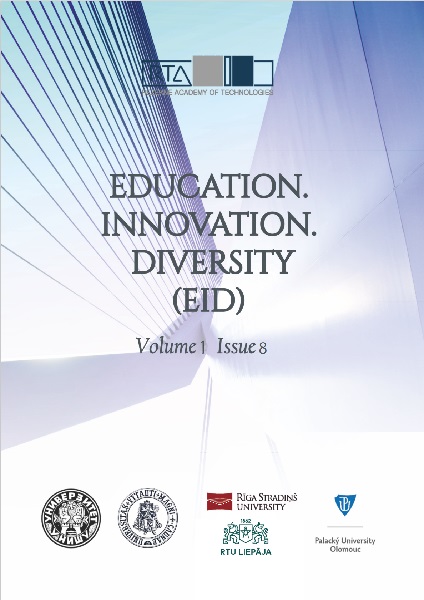PUPILS’ WRITTEN LANGUAGE IN THE LATVIAN LANGUAGE AND HISTORY STATE EXAMINATIONS IN LATGALE IN 2021
DOI:
https://doi.org/10.17770/eid2024.1.7936Keywords:
examinations, Latvian language, orthography, syntax, textAbstract
The research aims to examine pupils’ text creation skills in the Latvian language and history state examinations (CE). The source of the research is the examination papers of pupils in Latgale in 2021: Latvian language CE (a substantiated opinion; 250 words) and history CE (task 3 of part 3 – an essay; 200 words). Evaluation criteria of both examinations show that the quality of spelling is considered more important in the Latvian language examination (10 points out of 34 (approx. 30%) can be obtained for orthography and punctuation).
The article summarises the main types and number of errors in morphology and syntax in both exams. In morphology, several types of errors are distinguished: unmotivated use or absence of long characters, misspelling of consonants, errors in the spelling and hyphenation of words, misspelling of proper names, misspelling of verbs and foreign words. The number of errors in pupils‘ work was also determined for several syntactic constructions: coordinated parts of sentence, coordinated parts of sentence with a generalising word, participial clauses, insertions, and explanatory word groups. The number of punctuation errors in sentences, separating the parts of a compound sentence and a complex sentence, and unmotivated uses of punctuation were also investigated.
Comparing the quality of students’ written language in Latvian and history, it can be concluded that the quality of writing in both exams remains similar for the same student. There are pupils with no orthographic and punctuation errors in both examinations. Some students have some spelling and punctuation errors in both examinations. Some pupils have many spelling and punctuation errors in both examinations. This result is an indication that students follow spelling and punctuation norms according to their knowledge, skills, and writing culture. The study does not support the hypothesis that in the writing part of exams in subjects other than the Latvian language, pupils’ knowledge is weaker and a more negligent attitude towards writing culture would be observed.
References
Anspoka, Z. & Martena, S. (2021). Latviešu valodas lietpratība un tās pilnveides iespējas vidusskolā. Metodisks līdzeklis skolotājiem, mācību līdzekļu autoriem un vērtētājiem [Latvian Language Proficiency and Opportunities for Its Improvement in Secondary School. A Methodological Tool for Teachers, Teaching Aid Authors and Evaluators]. Liepāja: LiePA.
Celce-Murcia, M. & Olshtain, E. (2000). Discourse and Context in Language Teaching. Cambridge: Cambridge University Press.
Daszkiewicz, M., Wenzel, R. & Kusiak-Pisowacka, M. (2019). Education Role of Language Skills. Gdansk: University of Gdansk.
Gavriļina, M. & Špūle, K. (2018). Latvijas skolēnu valodas (gramatiskās) kompetences analīze. Izglītība zinātnei un praksei: LU Pedagoģijas, psiholoģijas un mākslas fakultātes Skolotāju izglītības nodaļas rakstu krājums. Rīga: UL Academic Publishing House, p. 17–25. Retrieved from: https://www.apgads.lu.lv/fileadmin/user_upload/lu_portal/apgads/PDF/Izglitiba-zinatnei0un-praksei/02_Gavrilina_Spule-IZP.pdf
Kvašīte, R. (2013). Latviešu valodas stili. Latviešu valoda. Rīga: LU Akadēmiskais apgāds, 175–192.
Latviešu valoda (2021). Latviešu valodas centralizētā eksāmena vērtēšanas kritēriji. Retrieved from: https://www.visc.gov.lv/lv/media/16108/download?attachment
Martena, S., Laiveniece, D. & Šalme, A. (2022). Lingvodidaktika: latviešu valodas mācības pusaudžiem un jauniešiem. Rīga: Latviešu valodas aģentūra.
Standarts (2020). Noteikumi par valsts vispārējās vidējās izglītības standartu un vispārējās vidējās izglītības programmu paraugiem. Retrieved from: https://likumi.lv/ta/ id/309597-noteikumi-par-valsts-visparejas-videjas-izglitibas-standartu-un-visparejas-videjas-izglitibas-programmu-paraugiem
Straupeniece, D. & Dzintars, N. (2023a). Skolēnu rakstu valoda latviešu valodas un vēstures valsts pārbaudes darbos 2021. gadā Kurzemē. Vārds un tā pētīšanas aspekti : rakstu krājums, 27. Atb. red. Linda Lauze. Liepāja: LiePA, 2023, 61–71. DOI: doi.org/10.37384/VTPA.2023.27.061
Straupeniece, D. & Dzintars, N. (2023b). Pupils’ written language in the Latvian language and history state examinations in Riga in 2021. Human, Technologies and Quality Of Education,. 632–644. DOI: https://doi.org/10.22364 /htqe.2023.50
Vēsture (2021). Vēstures centralizētā eksāmena vērtēšanas kritēriji. Retrieved from: https://www.visc.gov.lv/lv/media/16114/download?attachment
VISC (2007). Skolēnu sasniegumu analīze tekstveidē latviešu valodas un literatūras centralizētajā eksāmenā: situācijas izpēte un ieteikumi. Retrieved from: https://www.visc.gov.lv/lv/media/454/download?attachment
VISC (2012). Centralizētā eksāmena latviešu valodā rezultāti un secinājumi. Metodiskais materiāls. Retrieved from: https://registri.visc.gov.lv/vispizglitiba/eksameni/dokumenti/metmat/latv_val_rez_sec_metmat.pdf
VISC (2015). Centralizētais eksāmens latviešu valodā 2014./2015. mācību gadā: rezultātu analīze un metodiskie ieteikumi. Metodiskais materiāls. Retrieved from:
https://registri.visc.gov.lv/vispizglitiba/eksameni/dokumenti/metmat/2014_2015_ce_latval_analize.pdf
VISC (2020). Centralizētā eksāmena latviešu valodā rezultāti 2019./2020.m.g. un ieteikumi. Retrieved from: https://registri.visc.gov.lv/vispizglitiba/eksameni/dokumenti/metmat/prezent_lv12_2020_un_ieteikumi.pdf
VPSV (2007). Valodniecības pamatterminu skaidrojošā vārdnīca. Rīga: LU LVI
Downloads
Published
Issue
Section
License
Copyright (c) 2024 Education. Innovation. Diversity.

This work is licensed under a Creative Commons Attribution 4.0 International License.






